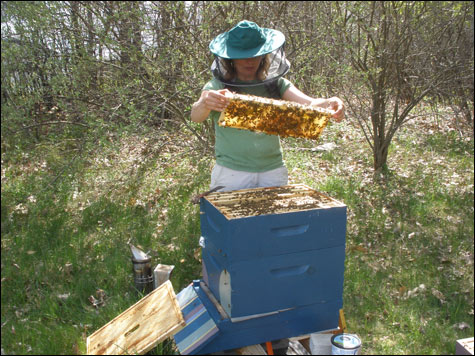
CHECKING OUT THE HIVE Erin MacGregor-Forbes inspects one of her bee colonies. |
The cold, rainy weather enveloping Portland has led meteorologists to apologize daily for the lack of sunshine in their seven-day forecasts, but it's the bees that are really suffering. "There is a wide realm of acceptable weather for bees to move around in, but if it's too cold or rainy — like it is now — they won't fly," says Erin MacGregor-Forbes, a master beekeeper who serves as president of the Maine State Beekeepers Association.
Even if the bees were out and about, all the rain washes nectar out of flowers, leaving the insects with nothing to collect. Despite the less-than-ideal weather, her nine colonies are looking strong, she says, as she pulls out a honeycomb made up of perfect hexagonal wax cells of honey, pollen, and eggs. This time of year there are about 30,000 bees in each hive; by August, the hive will double in size. Bees dramatically reduce their population in the winter, subsisting on the honey they collect during the summer months.
Interest in backyard beekeeping has increased dramatically in the last five years, says MacGregor-Forbes, who teaches three courses through the University of Maine Cooperative Extension program. Off the top of her head, she can think of 25 urban beekeepers in the city of Portland, but there are about 800 beekeepers in Maine who manage a total of 10,000 hives. "Most people keep bees as a way to give back to the environment," she says. "The bonus is that they get honey."
And they get a good amount of honey, too. A strong colony can yield up to 100 pounds a year. To make just one pound of honey, bees must tap two million flowers. There are two harvests, resulting in distinct honeys depending on the variety of flora in bloom. In late June or early July (or even later this year, depending on the weather), is the first-bloom harvest. Honey from this first harvest is light in flavor and color. The fall crop, which is harvested in late August or early September, is much darker and richer, even reaching a deep, red wine color.
Getting a hardy supply of honey isn't the only benefit of backyard beekeeping. Bees can spruce up the entire neighborhood. "Bees improve the fruit- and seed-sets of plants all around," MacGregor-Forbes says. From spring to early summer, honeybees have a natural instinct to swarm. It's a matter of continuing the species, and happens when the old queen bee leaves the hive with a large colony of her subjects when a new queen is about to emerge. Swarms are relatively simple for beekeepers to retrieve, she says, and colonies will happily set up shop in an empty beehive.
MacGregor-Forbes emphasized that beekeeping isn't simple or cheap. Beekeepers must maintain a minimum of two colonies. "If something goes wrong, the only way to fix it is by another colony," she says. Keeping two colonies requires a good chunk of change — upwards of $1100 to buy the bees and equipment to sustain them. This doesn't include an extractor, which is basically a centrifuge that spins the honeycombs and harvests the honey.